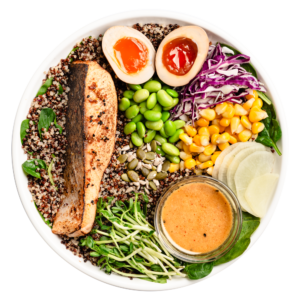Salads have transformed from basic sides into nutrient-packed meals with numerous health benefits. At SaladStop!, the Iron ‘Wo’ Man Salad is a prime example of a hearty, delicious, and nutritious meal designed with both flavor and functionality in mind. This vegetarian salad, composed of baby spinach, feta, warm baked mushrooms, roasted pumpkin, toasted almonds, pomegranate seeds, raisins, and topped with a Spiced Berry Vinaigrette, offers a satisfying and healthful option for those who want a balanced plant-based meal. Let’s explore what makes this salad a standout for vegetarians and health-conscious eaters alike.
Baby Spinach: Iron and Antioxidant Richness
As its name suggests, the Iron ‘Wo’ Man Salad provides a hefty dose of iron, with baby spinach serving as its foundational ingredient. Spinach serves as one of the best plant-based sources of non-heme iron, a vital mineral that supports oxygen transportation and energy production in the body. Iron is especially crucial for vegetarians, as they often struggle to get enough from their diet compared to meat-eaters.
In addition to iron, spinach boasts essential vitamins and minerals like vitamin K, folate, and magnesium, which make it one of the most nutrient-dense greens available. Spinach’s high antioxidant content, including vitamin C and beta-carotene, helps to protect your cells from oxidative damage, supporting overall health and longevity.
Feta: A Protein-Packed, Vegetarian-Friendly Cheese
Feta cheese adds both creaminess and tang to the Iron ‘Wo’ Man Salad, enhancing its overall flavor profile while providing a valuable source of protein. For vegetarians, finding diverse and convenient protein sources is essential, and feta fits the bill perfectly.
Feta cheese is also rich in calcium, which is crucial for maintaining strong bones and teeth. Its combination of protein and calcium makes it an ideal ingredient for active individuals or those looking to support their musculoskeletal health. The slightly salty tang of feta also pairs beautifully with the salad’s roasted and sweet elements, offering a balance of flavors.
Warm Baked Mushrooms: A Meaty, Nutrient-Dense Addition
Mushrooms, particularly when baked, add a savory, umami flavor and a “meaty” texture to this vegetarian dish. Warm baked mushrooms in the Iron ‘Wo’ Man Salad not only make the dish more satisfying but also provide a variety of essential nutrients. Mushrooms provide B vitamins like riboflavin and niacin, crucial for energy production and maintaining healthy skin and nerves.
Mushrooms are also one of the few plant-based sources of vitamin D when exposed to sunlight, a nutrient important for calcium absorption and bone health. For vegetarians, getting enough vitamin D can sometimes be challenging, so mushrooms provide a valuable addition to a balanced diet.
Roasted Pumpkin: Fiber and Beta-Carotene Boost
The roasted pumpkin in this salad delivers both flavor and nutrition in spades. Pumpkin is high in dietary fiber, promoting digestive health and keeping you feeling full and satisfied longer. This is especially beneficial for those following a plant-based diet because fiber supports gut health and regulates blood sugar levels.
Additionally, pumpkin is loaded with beta-carotene, the antioxidant responsible for its vibrant orange color. Beta-carotene is converted into vitamin A in the body, which is vital for maintaining healthy skin, vision, and immune function. The roasted pumpkin provides a deliciously sweet, caramelized flavor that pairs well with the Spiced Berry Vinaigrette.
Toasted Almonds: Healthy Fats and Crunch
Toasted almonds bring a delightful crunch to the Iron ‘Wo’ Man Salad while adding heart-healthy fats, plant-based protein, and fiber. Almonds, rich in monounsaturated fats, help maintain healthy cholesterol levels and support cardiovascular health, especially for vegetarians.
Almonds provide vitamin E, an antioxidant that protects cells from oxidative stress and promotes healthy skin. The inclusion of nuts like almonds adds both texture and depth to the salad, making it more satisfying and nutrient-dense.
Pomegranate Seeds and Raisins: Sweet Antioxidant Powerhouses
Pomegranate seeds and raisins add natural sweetness to the Iron ‘Wo’ Man Salad while delivering powerful nutrition. It is rich in antioxidants, particularly polyphenols, which have been linked to heart health and anti-inflammatory effects. These small seeds also provide vitamin C, which helps the body absorb the iron from spinach more efficiently.
Raisins, meanwhile, are a great source of iron and potassium. Despite their small size, they are packed with nutrients that support energy levels and electrolyte balance. These naturally sweet ingredients offer a great contrast to the savory flavors in the salad, creating a well-rounded taste experience.
Spiced Berry Vinaigrette: A Flavorful Finishing Touch
The Spiced Berry Vinaigrette adds sweet, tangy, and slightly spiced flavors, bringing all the Iron ‘Wo’ Man Salad ingredients together. This vinaigrette, made with antioxidant-rich berries, not only adds complexity to the dish but also brings additional health benefits. The berries used in the vinaigrette provide extra vitamins and antioxidants, which can help reduce inflammation and promote heart health.
SaladStop!’s Iron ‘Wo’ Man Salad is a nutrient-dense, vegetarian meal that offers a perfect balance of flavors and health benefits. This salad combines iron-rich spinach, protein-packed feta, immune-boosting mushrooms, and antioxidant-rich ingredients to fuel your body and mind. Topped with a delicious Spiced Berry Vinaigrette, the Iron ‘Wo’ Man Salad is not just a meal—it’s a celebration of plant-based nutrition and flavor. Whether you’re a vegetarian or simply seeking a wholesome, nutrient-packed option, this salad offers everything you need to nourish your body and satisfy your taste buds. Ready to fuel your day? Order here!




